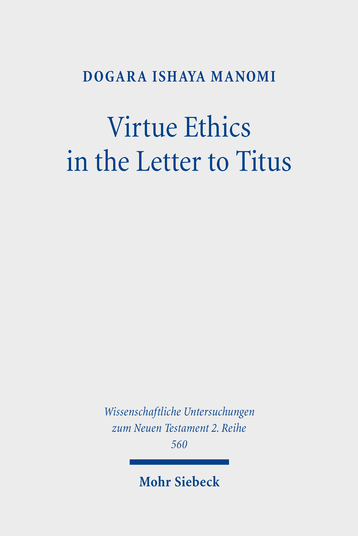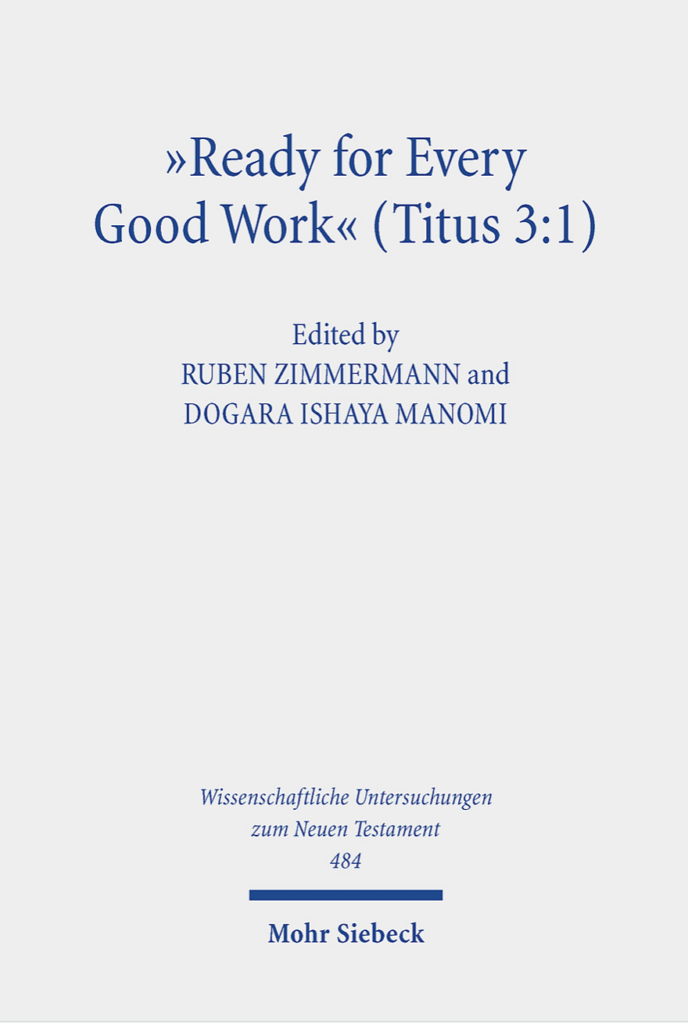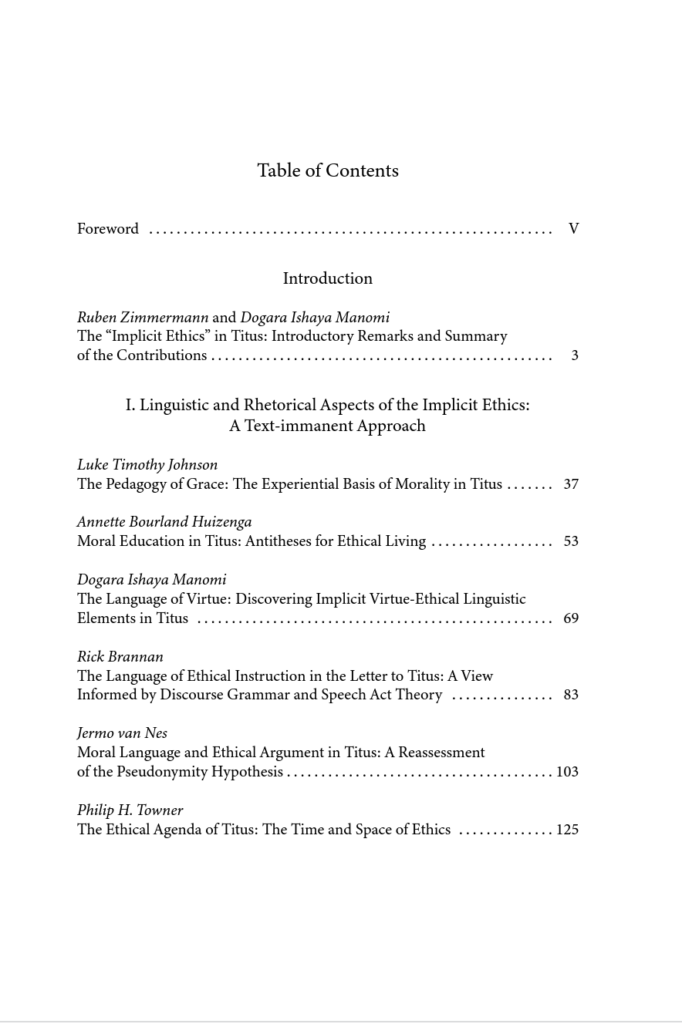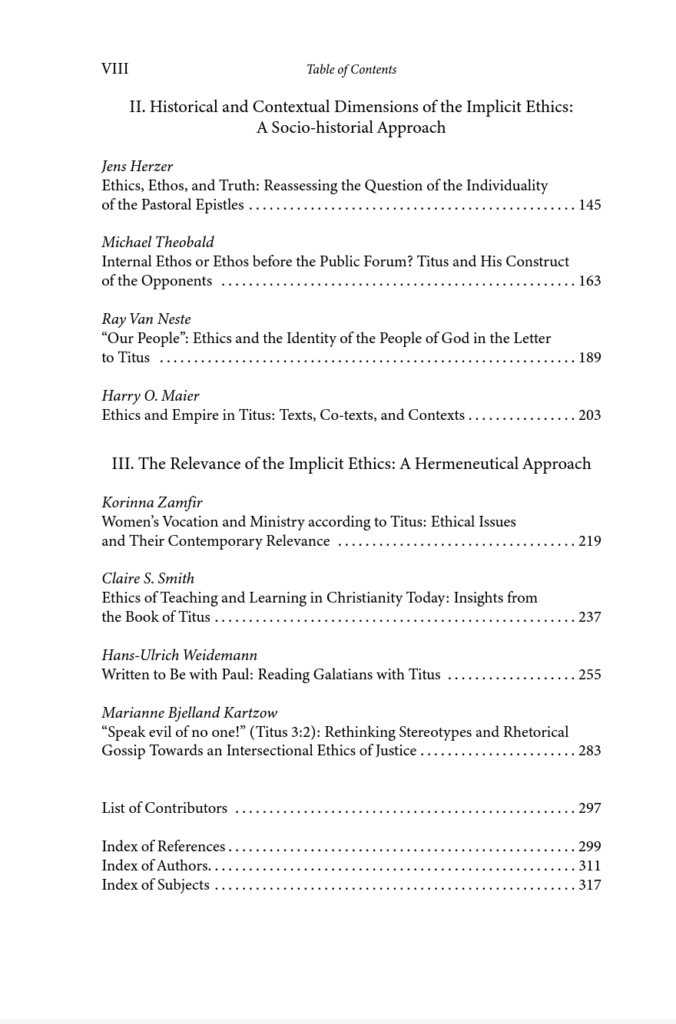
The first of two WUNT volumes on ethics in Titus expected this year and next is now available. Both are part of WUNT’s Context and Norms of New Testament Ethics series. The volume of the proceedings of the 2019 “Ethics in Titus” conference held at Johannes Gutenberg University in Mainz, Germany, is still forthcoming. Just published, however, is a recent dissertation by Dogara Manomi. The two volumes are not formally related — they are not a two-part publication — but Manomi is integrally involved in both.
Dogara Ishaya Manomi. Virtue Ethics in the Letter to Titus: An Interdisciplinary Study. Kontexte und Normen neutestamentlicher Ethik / Contexts and Norms of New Testament Ethics 12. Wissenschaftliche Untersuchungen zum Neuen Testament 2/560. Tübingen: Mohr Siebeck, 2021. [Mohr Siebeck’s German title is more descriptive: Tugendethik im Brief an Titus: Eine interdisziplinäre Interaktion von biblischer Ethik und Tugendethik mit hermeneutischen Reflexionen aus der Perspektive der afrikanischen Ethik]
Manomi is currently a full-time lecturer at the Theological College of Northern Nigeria located in Jos, Plateau state, Nigeria, an Affliated Researcher of the Evangelische Theologische Faculteit, Leuven, Belgium, and a Research Associate of the University of Pretoria, South Africa.
I had not known much about virtue ethics before I read Manomi’s monograph, but his helpful survey of the topic (before bringing it to bear upon the Epistle to Titus) brought me up to speed. I provide here the publisher summary of the volume and major headings:
“Dogara Ishaya Manomi analyzes and identifes the characteristics of (neo-)Aristotelian virtue ethics that are implicitly and explicitly embedded in the linguistic elements, theological motifs, and ethical norms in the letter to Titus. He argues that (neo-)Aristotelian virtue ethics and the ethical perspectives of Titus share the following features: a sense of a moral telos that leads to human flourishing; emphasis on character, habits, and inner dispositions; focus on the morality of persons more than the morality of actions; commitment to moral perfectionism; particularity of moral agents; the concept of moral exemplar; a concern for character development through training or moral education; and a consideration of the moral significance of community. The author concludes, therefore, that there is a significant correlation between (neo-)Aristotelian
virtues ethics and the ethical perspectives of the letter to Titus, to the extent that the letter to Titus can be described as a virtue-ethical text. Moreover, his research concludes that the virtue-ethical perspectives of Titus, in comparison with African
ethics, have foundational and narrative differences, yet they share some important similarities. However, through progressive hermeneutical negotiations, concessions, appropriations, and application between the two virtue-ethical perspectives, there emerges a new virtue-ethical horizon described as ‘African Biblical Virtue Ethics,’ which is, as accountable as possible, faithful to the virtue-ethical perspectives of Titus and ‘at home’ to African Christian ethics.
This study was awarded the prestigious Johannes Gutenberg Dissertation Prize.”
I. Description of Contents and Methodology
II. History of Interpretation of the Selected Virtues in Titus
III. A Virtue-Ethical Reading of the Letter to Titus
IV. Appropriating the Virtue-Ethical Perspective of Titus
into African Ethics: Hermeneutical, Contextual, and Ethnological
Reflections
V. Summary and Conclusion





 We had a great session at the
We had a great session at the